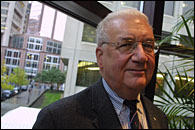Man against militia
Four years ago, Jack Granatstein asked the nation "Who Killed Canadian History?" Now, in his latest book, he wants to answer the question "Who Killed Canada's Army?" Granatstein spoke at McGill's bookstore on October 16 to launch his new book Canada's Army: Waging War and Keeping the Peace (Univeristy of Toronto Press). For the outspoken historian, the mighty tome -- which traces the development of Canada's land forces from the ill-trained militias of 1812 to the underfunded force of today -- is a perfect blend of his advocacy and scholarship.
 Historian Jack Granatstein
Historian Jack GranatsteinPHOTO: Owen Egan |
|
"It really does tie together many of my interests -- it really wrote itself," he said. "But it's not my life's work -- I'm a professional. My next book will be my life's work, and so will the one after that."
It's as much an argument as a history. Granatstein takes aim at the "militia myth" that he says has shaped much of Canada's military policy -- the myth that citizen soldiers can be an effective fighting force, able to enforce Canada's interests here and abroad. It's a myth that took shape with our so-called "victory" in the War of 1812.
"If we are to have an army, and we must, then it is a crime to send it into action without the training and leadership it needs to fight well and prevail. This nation has done that far too often in the past, paying a high price in lives while the requisite professionalism developed. The present state of the Canadian Forces suggests that Canadian governments are prepared to do so again in the future," he said, reading from the conclusion of his book.
The "militia myth" had enough force that when Canada was called to war in 1914 and in 1939 we sent under-equipped men under the command of under-trained officers. The result was slaughter on the battlefield, until the process of war forced our troops to become professional. At some point in the future, unless we are willing to pay for the "insurance policy" of a professional standing army with modern equipment, we will face the same consequences again.
"The equation is and always has been very simple -- you pay in dollars for competent soldiers, or you pay later in dollars and your sons and daughters," he warned.
Despite Granatstein's mantra of professionalism, the man he singled out as Canada's best fighting soldier was a real-estate salesman and part-time militia officer before being thrust to command of the Canadian Expeditionary Force in World War One. Sir Arthur Currie -- who in his post-war career was principal of McGill -- was hardly a model of a professional soldier, but Granatstein praised his ability to learn, and to trust his judgement on the field.
Granatstein's book, although a history of the Canadian Army, was written with the here and now very much in mind. He said that the military -- due to political neglect and cutbacks -- has been declining in quality since the 1960s. He acknowledges that this country will never be able to field a large army, capable of defending our vast territory, but he believes that it is within our means to field a top-quality small army. That we still aren't moving in that direction leaves him flabbergasted.
"In the last Throne speech there wasn't any mention of funding for the military. They just said there would be consultation. I thought we were doing that already," he said.
Historically, Canadians have rarely been in favour of military spending. In fact, one of the first promises the Chrétien Liberals kept when they won office in 1993 was to scrap the proposed replacement for Canada's antique Sea King helicopters. Granatstein says that that was then.
"This isn't 1993 anymore and people realize that we have our young men up in helicopters that should have been scrapped," he said.
"Polls have consistently shown that Canadians want a better military. Usually this government is very responsive to that sort of thing."

